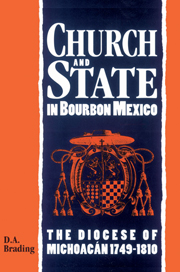Crossref Citations
This Book has been
cited by the following publications. This list is generated based on data provided by Crossref.
CERVANTES, FERNANDO
1995.
The Impact of Christianity in Spanish America.
Bulletin of Latin American Research,
Vol. 14,
Issue. 2,
p.
201.
FOWLER, WILL
1996.
Introduction: The‘Forgotten Century’: Mexico, 1810–19101.
Bulletin of Latin American Research,
Vol. 15,
Issue. 1,
p.
1.
Krippner-Martinez, James
2000.
Invoking “Tato Vasco”: Vasco de Quiroga, Eighteenth-Twentieth Centuries.
The Americas,
Vol. 56,
Issue. 3,
p.
1.
Poole, Stafford
2000.
The Cambridge History of Religions in America.
p.
239.
Lynch, John
2001.
Latin America between Colony and Nation.
p.
109.
Riley, James D.
2002.
Public Works and Local Elites: The Politics of Taxation in Tlaxcala, 1780-1810.
The Americas,
Vol. 58,
Issue. 3,
p.
355.
Larkin, Brian R.
2004.
Liturgy, Devotion, and Religious Reform in Eighteenth-Century Mexico City.
The Americas,
Vol. 60,
Issue. 4,
p.
493.
Riley, James D.
2006.
The Cambridge History of Christianity.
p.
371.
Brown, Stewart J.
and
Tackett, Timothy
2006.
The Cambridge History of Christianity.
Chowning, Margaret
2008.
Convents and Nuns: New Approaches to the Study of Female Religious Institutions in Colonial Mexico.
History Compass,
Vol. 6,
Issue. 5,
p.
1279.
Delgado, Jessica
2009.
Sin Temor de Dios: Women and Ecclesiastical Justice in Eighteenth-Century Toluca.
Colonial Latin American Review,
Vol. 18,
Issue. 1,
p.
99.
Melvin, Karen
2009.
Charity without Borders: Alms-Giving in New Spain for Captives in North Africa.
Colonial Latin American Review,
Vol. 18,
Issue. 1,
p.
75.
Butler, Matthew
2009.
Sotanas Rojinegras: Catholic Anticlericalism and Mexico's Revolutionary Schism.
The Americas,
Vol. 65,
Issue. 4,
p.
535.
2010.
A Flock Divided.
p.
159.
2010.
A Flock Divided.
p.
281.
2010.
A Flock Divided.
p.
1.
2010.
A Flock Divided.
p.
123.
2010.
A Flock Divided.
p.
55.
2010.
A Flock Divided.
p.
239.
2010.
A Flock Divided.
p.
185.





